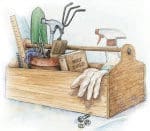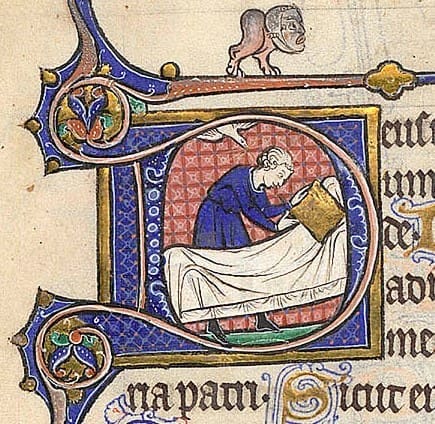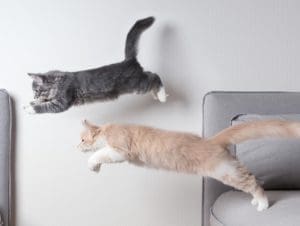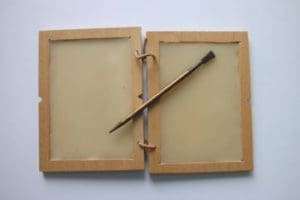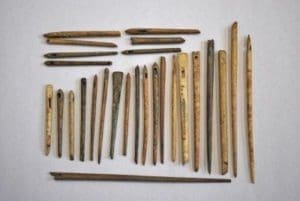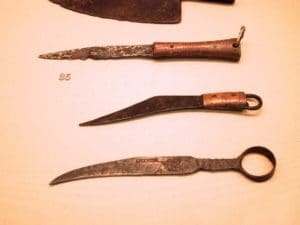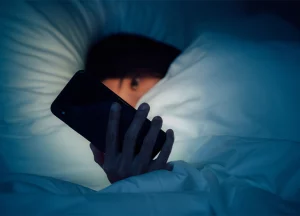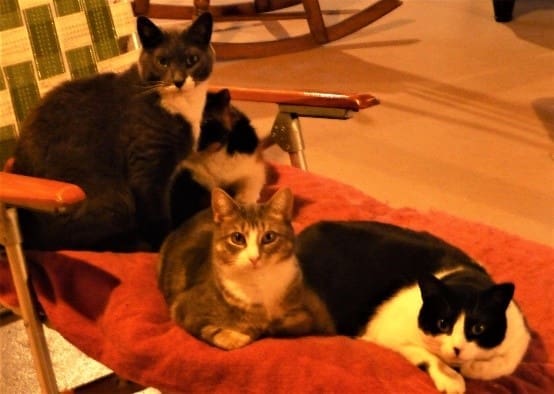“They sleep clothed, and girded with belts or cords;
but they should remove their knives,
lest they accidentally cut themselves in their sleep.” RB 22.5
Welcome to “What To Do About Those Dangerous Knives!”
I’m Resident Novice Michael James. The human companion of Worldwide Novices Diamond and Pearl suggested this verse. She mused, “The verse about not sleeping while wearing a knife has always made me wonder if the monks of Benedict’s day weren’t somewhat dim-witted to need that sort of warning!”
Excellent point! Amma has suggested, tongue in cheek, that they had lost their full reasoning power from consuming the recommended daily allottment of wine. (RB 40.3)
“…we believe that a half bottle of wine a day is sufficient for each. But those to whom God gives the strength to abstain must know that they will earn their own reward.” RB 40.3-4
I volunteered to unpack this verse from The Rule of St. Benedict because it puzzles me, too.
1) Why was it necessary to tell the monastics to not sleep with knives because they could cut themselves? Were they dim?
2) Why were they wearing knives anyway? You don’t WEAR a knife to cut a piece of bread, or trim nails, or a branch out in the field. We felines NEVER wear knives. I never wore a knife even when I was a Tough Cat in Newark, New Jersey. (See Michael James’ interesting bio here and scroll down.)
3) And of the utmost importance, what in the world can I tell humans about this verse that will be helpful to them? That’s what we felines are charged with in the Feline Cloister.
You are invited to take a look at what I discovered to answer these questions.
Dissecting the Verse – RB 22.5
A Medieval Benedictine
preparing his bed for sleep. Note no knife.
This puzzling verse comes from the chapter – The Sleeping Arrangements of the Monastics. Here’s the whole verse.
”They sleep clothed, and girded with belts or cords; but they should remove their knives, lest they accidentally cut themselves in their sleep.” RB 22.5
When I started to read the chapter I wondered why they slept fully clothed. Now, we felines do this as we have but one outfit. The humans I know usually wear pajamas or night gowns, but not what they would wear during the day. This may have been true in ancient times as well. Otherwise why would Benedict have stated that monastics should remain fully clothed? Benedict must have known what I was mewing to myself about for he answers my question in the next verse.
“Thus the members will always be ready to arise without delay when the signal is given; each will hasten to arrive at the Opus Dei before the others, yet with all dignity and decorum.” RB 22.6
Meee-ow!! The principal reason that the brothers sleep clothed is so that they can spring out of bed when the bell for the night office sounds. They are ready immediately and don’t have to rummage around for clothing. They can quickly zip to the oratory for prayers and psalms, just like we felines do!
Benedict even encourages a “competition” to arrive at the Opus Dei before the others. He does state emphatically in Chapter 43 – Tardiness at the Opus Dei or at Table.
“Indeed, nothing is to be preferred to the Opus Dei.” RB 43.3
Illus. Benedictine felines hastening
“to arrive at the Opus Dei before the others,
yet with all dignity and decorum.”
When we unpack verses in the Rule, Br. Ricky encourages us to any check sources that Benedict used. I found that the Rule of the Master, one of Benedict’s primary sources, also says to remove knives before sleeping in order to prevent being pierced. The Master elaborated on the point as he usually does…
“…lest when he turns over while fast asleep the point of the knife come out of the sheath and pierce his flesh.” Rule of the Master, 11.111-112.
That both rules say to remove knives indicates, in my book, that sleeping with knives was common. Was it? And why?
The Rule and Knives
I found a very informative paper written by feline Benedictine scholar Sr. Scholastica Muffin, OSB-F, “Knives and Sleeping Monks in Sixth-Century Italy.” [1]
Sr. Scholastica pointed out that the superior of the monastery provided all that the monastic would need for daily life. Note that this includes a knife for each member.
“…the prioress or abbot is to provide all things necessary: that is, cowl, tunic, sandals, shoes, belt, knife, stylus, needle, handkerchief and writing tablets.”
RB 55.18b,19
Knives were important for day-to-day monastic living. They served multiple purposes, for example to cut a piece of bread, to carve wood, to make other tools, to cut a branch in the field, and so forth.
In Chapter 32 – The Tools and Goods of the Monastery, we read that needed tools were given out by a monastic trusted by the superior. These tools were then collected after use at the end of the day. RB 32.2 Since tools were to be handed in after use, why did the monastics hang on to their knives??
Sleuthing Knife Use in the Sixth Century
Sr. Scholastica provides clues to answer this question of hanging onto knives. She begins with accounts of two emperors and knives.
The Gothic King Theodoric (493-526) “forbade any Roman to carry arms, except a small knife.” [2]
Later, Justinian, the Eastern Roman emperor from 527 to 565, followed suit. He legislated in his Novella 85, a legal code that “forbade private citizens to manufacture and purchase weapons, with the exception of small knives that no one could use in warfare.” [See “Endnotes” for an unpacking of Novella]
The Greek Procopius of Caesarea (500 – 565) was a prominent late antique Greek scholar and historian from Caesarea Maritima. He wrote an account of wars waged by Justinian that documents use of the small knife (machairia) as a weapon. [3]
The Three Guys
Theodoric the Great
on a coin
Emperor Justinan
pondering new Novellas
Procopius of Caesarea scanning
for small knives in battle
Sr. Scholastica found that knives, in addition to other uses, were considered a minor weapon that could be carried by Roman citizens.
“Spears and swords were doubtless used only for combat, whereas it is possible that knives and daggers / styluses could serve for both self-defence in an emergency situation (like the handguns or knives which are sometimes issued to present-day soldiers) and for other purposes.” [4]
The Monastic and Small Knives
And so, we are back to the question almost ready to be answered. Why did monastics want to take their knives to bed??
If self-defense was a primary use for these small knives, why would monastics need them?
“Being smaller and easier to handle than a sword, these short blades were often carried from waist belts. Both Procopius and Gregory of Tours depict soldiers wearing them, yet it is likely that farmers and craftsmen were also equipped with waist belts,” (Novice Michael James’ emphasis.) [5]
A sampling of 6th century
small knives
Benedict was aware that his members had carried knives with them out of necessity. He “therefore advised them not to do so out of practical and not moral reasons.” [6]
Do you think that, within the monastery Benedict might have wantedthe members to trust each other and God with their safety at night? I think so.
The Take-Away for Humans on “Knives“
Now, the biggest question – What can I to offer to you about this verse that can be helpful in your daily life?
People slept with knives in the sixth century to protect themselves, just in case. What do people keep close today to feel safe or for “just in case?”
What comes to my mind is the cellphone.
I would mew that many people have a cellphone by their bed at night, checking it before they go to sleep, jumping on it in the morning before they get out of bed. It’s not on any belt, (although maybe it is??), but it is very close by. Is this your normal sleeping arrangement, too?
Humans won’t cut themselves in a literal sense. But having that phone there, falling into temptation to check this and that, can surely cut a good night’s sleep to shreds. It can also impact the whole day before the feet even hit the floor.
Just one more look…
or is it the Salted Peanut Syndrome.
Just one more look, one more,
one more…
Cellphone Knife Addiction Conquered!
In her book Liturgy of the Ordinary: Sacred Practices in Everyday Life, Tish Harrison Warren describes here cellphone “knife.”
“…my typical morning routine was that shortly after waking, I would grab my smartphone. Like digital caffeine, it would prod my foggy brain into coherence and activity. Before getting out of bed, I’d check my email, scroll through the news, glance at Facebook or Twitter.
“My morning smartphone ritual was brief – no more than five or ten minutes. But I was imprinted. My day was imprinted by technology…I’d look for all good things to come from glowing screens.” [7]
The imprint for Warren and for anyone using this practice, is really a piercing of the flesh. Knives have a beneficial use, as do smartphones…at the right time for the right use. But at the wrong time, they are dangerous.
The Rev. Tish Harrison Warren smiling and well-rested
after
she banished the cellphone knife
from the bedroom
Ms. Warren discovered the negative imprint that the techno-knife left on her day. She made some changes. She stopped waking up with the cellphone. In fact, she banished it from the bedroom. Instead, she began her day, after making her bed, of course, with silence and in conversation with God.
“And I sat. At times, I’d read Scripture. Most often I’d pray. I’d begin with the Lord’s Prayer. Then I’d invite God into the day. I’d pray the words of the Morning Office: ‘Open my lips, O Lord, and my mouth shall declare your praise’…I sat expectantly.
“I’d lay out my worries, my hopes, and my questions before God, spreading them out in his presence like Stretched-our sheets. I’d pray for my work and family, for decisions, for a meeting scheduled later in the day. But mostly, I’d invite God into the day and just sit. Silent. Sort of listening. Sort of just sitting.” [8]
“God made this day. He wrote it and named it and has a purpose in it.
Today, he is the maker and giver of all good things.”
Closing Mews
What a beautiful way to begin the day – to be intentionally with God as the very, very first thing of the day.
I encourage you to evaluate your cellphone before sleeping and upon awaking. If needed, please make changes like Tish Harrison Warren made… lest accidentally you cut some sleep or pierce the day.
FYI – There is also plenty of scientific evidence that cites the harmful effects of cellphone usage right before bed.
I had fun researching and writing this. Hope what I said was interesting and helpful.
Your feline friend in Christ,
Resident Novice Michael James
Novice Michael James never looks at his cellphone before bed.
Endnotes
[1] Sr. Scholastica Muffin quotes from the following: Marco Christini, “Knives and Sleeping Monks: Benedict’s Rule and Self-Defense in Sixth Century Italy.” Brepols Publishers NV © 2023. See the paper here. I give it a paws up!
Marco Christini is a PhD at Scuola Normale Superiore (Pisa, Italy). His research interests include Ostrogothic Italy, diplomacy in Late Antiquity and the Early Middle Ages, Cassiodorus, Procopius of Caesarea and African Latin Christianity after Augustine. I give Marco a big “Mee-ow!” Such a scholar!
[2] Ibid, 7.
[3] Ibid., 7-9.
[4] Ibid., 9.
[5] Ibid., 12.
[6] Ibid., 13.
[7] Tish Harrison Warren, Liturgy of the Ordinary: Sacred Practices in Everyday Life (Downer’s Grove, IL, Inter Varsity Press, 2016) 26, 27. Tish Harrison Warren is a a priest in the Anglican Church in North America.
[8] Ibid., 28. Same for the following quote.
What is a Novella?
The Novellae Constitutiones (“new constitutions”; Ancient Greek: Νεαραὶ διατάξεις), or Justinian’s Novels, are now considered one of the four major units of Roman law initiated by Roman emperor Justinian I in the course of his long reign (AD 527–565).
Novella 85 is part of the Justinian Code, a legal code. It consisted of the various sets of laws and legal interpretations collected and codified by scholars under the direction of Byzantine Emperor Justinian I.
(Above from Marco Christi, “Knives and Sleeping Monks: Benedict’s Rule and Self-Defense in Sixth Century Italy,” 8.)
As a feline lawyer (Michael James, Esq-F), I find all of this fascinating. Hope you do too!
Br. Benedict Basil, OSB-F
does not find all of this fascinating.
He has succumbed to a stupor of idleness.
No cellphone (good), but a TV remote?!
